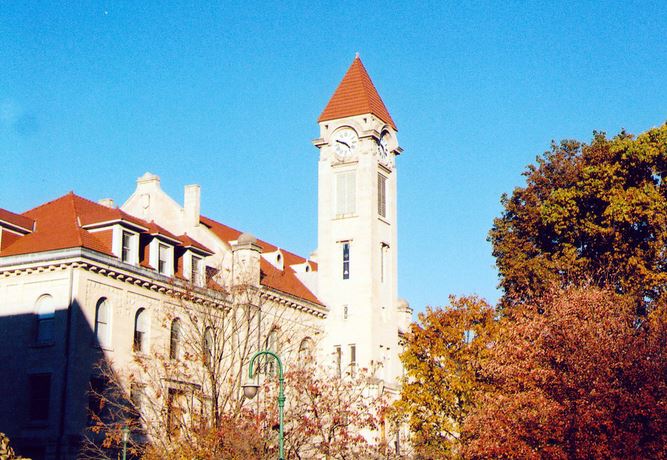How Will the Anti-LGBT Law Hurt College Enrollment in Indiana?

By:
Last week, Indiana Governor Mike Pence (R) caused a nationwide stir when he signed the Religious Freedom Restoration Act (RFRA), which permits businesses to deny services to gay couples for religious reasons. With the RFRA debate arising at the same time high school seniors decide on colleges to attend in the fall, it's possible that prospective out-of-staters will think twice about going to school in the state, especially if widespread disapproval from past and present Indiana college students is any indication.
Take Butler University, for instance. The Indiana academic institution, which came out against the RFRA alongside several other Indiana colleges, is a small private Indianapolis university with an undergraduate population of 4,126 students. After the little known institution got to the finals in the 2010 NCAA men's basketball tournament, applications soared 40 percent and the university population gained more out-of-state students than Indiana residents.
Though Butler University President James M. Danko said in his own statement that prospective students have expressed concern over RFRA, Marc Allan, Butler University's news manager, told ATTN: it's unclear whether 2015-2016 out-of-state enrollment will be impacted by the bill, "I think it’s too early to tell. A lot depends on what kind of 'clarification' we get from the General Assembly." Allan added that it might take a week for the university to have a better understanding of what the law means for fall out-of-state enrollment.
Jonathan Coffin, the Chief of Staff and Associate Vice President for Communications at Indiana's DePauw University, shared similar thoughts with ATTN:, "[W]e've had a number of inquiries from families of prospective students asking about the impact of this legislation and what it would mean for their student. It's too soon to know with certainty what this means for enrollment for next year, but it's something we will certainly be following closely. We're reminded our students---and our prospective students---of DePauw's (and President [Brian W.] Casey's) stance on this issue. We want our campus to be a welcoming place, and its important that we affirm that Indiana is as well."
Casey even tweeted about the RFRA over the weekend:
Joan Todd, the Interim Associate Vice President of University Marketing and Communications at Indiana's Ball State University, told ATTN: it's hard to predict what this means for fall numbers, "We can’t speculate on 2015-16 enrollment. We can, however, reiterate [BSU's] statement" reaffirming its commitment to diversity.
According to the Indiana Business Journal, out-of-state students make up 43.5 percent of Indiana University-Bloomington's population, a significant portion of the student body. IU-Bloomington President Michael A. McRobbie recently issued a statement of concern over the RFRA, but did not return a request for comment about what the RFRA might mean for 2015-2016 out-of-state enrollment at IU-Bloomington.
IU-Bloomington. Photo: Daniel Hartwig/Flickr
Julie Griffith, Purdue University's Vice President of Public Affairs, told USA Today that "[t]here is no way of knowing how this legislation could affect Purdue University."
Chancellor Rebecca Blank of the University of Wisconsin-Madison couldn't offer insights on how this might shape enrollment, but did say in a statement to ATTN:, "Diversity and inclusion of all people are core principles at the University of Wisconsin–Madison. The Indiana Religious Freedom Restoration Act mirrors laws in place in a number of states and at the federal level. But I take the concerns that have been raised very seriously. I look forward to a discussion with my Big Ten counterpart presidents and chancellors about the impact of the Indiana law."
Christopher Loss, as Associate Professor of Public Policy and Higher Education at Vanderbilt University, told ATTN: the law could have long-term negative effects on Indiana colleges, "The recently enacted RFRA law is an affront to many of the most cherished values of higher education—freedom, opportunity, fairness, and diversity, chief among them. Indiana’s colleges and universities know that the law, if left unchecked, would hinder their educational and research efforts by diminishing their ability to recruit top students and faculty. That’s why academic leaders in the state have been so upset and vocal in their opposition. It takes a lot to get higher education institutions to agree on anything these days, but the opposition to the RFRA is pretty overwhelming, and rightly so."
As noted by many of the university spokespersons above, there's still time to observe the effects of the RFRA on prospective Indiana students. Butler University, DePauw University, Purdue University, and IU-Bloomington give prospective students until May 1 to make a decision.
A lot could change in Indiana between now and August, but with college decision deadlines looming at the same time as the Indiana fracas, which continues to get crazier by the day, prospective Indiana students have more than academics to consider now. They're faced with the most important move of their lives at a time of mostly negative breaking news, and the drama might just be too overwhelming for out-of-state students, particularly if they're LGBT and don't want to relocate to a state that can legally discriminate against them.

